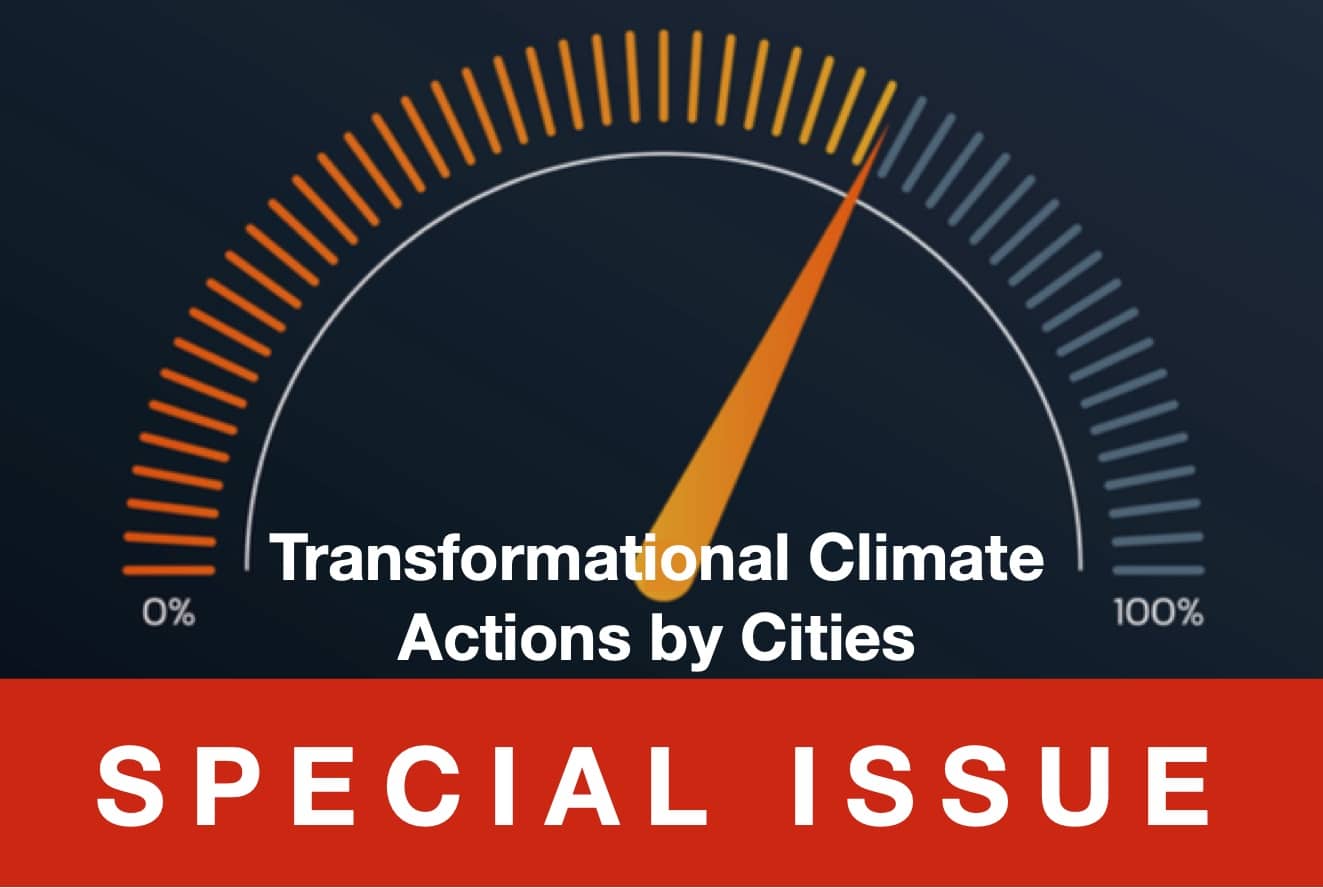
www.buildingsandcities.org/journal-content/special-issues/transformational-climate-actions-cities.html
Transformational Climate Actions by Cities

This special issue advances understandings of the nature, extent and effectiveness of cities' implementation efforts to realise low-carbon, climate resilient cities.
Papers in this special issue expose ambitious
actions that some municipalities are taking: visioning, target-setting, and
planning (undertaken with community engagement), climate-friendly regulations
(for the built environment and urban infrastructure particularly), innovations
in finance and capital mobilization to fund climate adaptation, novel
institutional configurations, and partnership arrangements with civil society
actors. Despite these progressive steps, these
papers reveal that an implementation gap remains.
Guest Editors: John B. Robinson and Kim R. Slater
Based on the case studies presented, the nature of this gap in large part stems from capacity and jurisdictional limitations, rather than a dearth of ambition or willingness to advance bold moves per se. Multiple insights emerge from the papers in this special issue regarding how local governments might begin to close the gap and meet the climate challenge.
A predominant theme in the papers is a need for more effective, multiway, climate governance. Vertically, there is a need for more coordinated efforts between levels of government, with higher levels of government enabling cities. Horizontally, there is a need for more coordinated/less siloed multi-departmental, multi-sectoral, multi-jurisdictional approaches.
In examining climate governance, this
collection of papers shows how social practice and transitions theories afford
complementary analytical approaches. Ultimately, they suggest both differing
and overlapping intervention points from social practice-informed
recommendations for normalizing climate action to multilevel perspective-informed suggestions for improved
niche-regime-landscape configurations and communication that accelerate
multisectoral climate action.
Meaningful public engagement, particularly by way of co-production processes, is also valuable for fostering social learning. Several papers highlight this can occur through multiple avenues such as experiments, pilots, demonstration projects, or living labs that involve residents and other community stakeholders helping to innovate climate interventions. It is vital that local governments ensure their regulations are flexible enough to accommodate and take up learning born of local experiments and living labs. The facilitation of collaborative visioning can help move local governments along the adaptation spiral, while prompting social learning among planners and policymakers.
Table of contents
Transformational climate actions by cities (Editorial)
K.R. Slater & J.B. Robinson
Institutionalisation of urban climate adaptation: three municipal experiences in Spain
M. Olazabal & V. Castán Broto
Stretching or conforming? Financing urban climate change adaptation in Copenhagen
S. Whittaker & K. Jespersen
Integrating climate change and urban regeneration: success stories from Seoul
J. Song & B. Müller
Transformational climate action at the city scale: comparative South-North perspectives
D. Simon, R. Bellinson & W. Smit
Assessing climate action progress of the City of Toronto
K.R. Slater, J. Ventura, J.B. Robinson, C. Fernandez, S. Dutfield & L. King
Climate action in urban mobility: personal and political transformations
G. Hochachka, K. G. Logan,
J. Raymond & W. Mérida
Canadian cities: climate change action and plans
Y. Herbert, A. Dale & C.
Stashok
Meeting GHG reduction goals with waste diversion: multi-residential buildings
V. MacLaren, E. Ikiz &
E. Alfred
Latest Peer-Reviewed Journal Content
Energy sufficiency, space temperature and public policy
J Morley
Living labs: a systematic review of success parameters and outcomes
J M Müller
Towards a universal framework for heat pump monitoring at scale
J Crawley, L Domoney, A O’Donovan, J Wingfield, C Dinu, O Kinnane, P O’Sullivan
Living knowledge labs: creating community and inclusive nature-based solutions
J L Fernández-Pacheco Sáez, I Rasskin-Gutman, N Martín-Bermúdez, A Pérez-Del-Campo
A living lab approach to co-designing climate adaptation strategies
M K Barati & S Bankaru-Swamy
Mediation roles and ecologies within resilience-focused urban living labs
N Antaki, D Petrescu, M Schalk, E Brandao, D Calciu & V Marin
Negotiating expertise in Nepal’s post-earthquake disaster reconstruction
K Rankin, M Suji, B Pandey, J Baniya, D V Hirslund, B Limbu, N Rawal & S Shneiderman
Designing for pro-environmental behaviour change: the aspiration–reality gap
J Simpson & J Uttley
Lifetimes of demolished buildings in US and European cities
J Berglund-Brown, I Dobie, J Hewitt, C De Wolf & J Ochsendorf
Expanding the framework of urban living labs using grassroots methods
T Ahmed, I Delsante & L Migliavacca
Youth engagement in urban living labs: tools, methods and pedagogies
N Charalambous, C Panayi, C Mady, T Augustinčić & D Berc
Co-creating urban transformation: a stakeholder analysis for Germany’s heat transition
P Heger, C Bieber, M Hendawy & A Shooshtari
Placemaking living lab: creating resilient social and spatial infrastructures
M Dodd, N Madabhushi & R Lees
Church pipe organs: historical tuning records as indoor environmental evidence
B Bingley, A Knight & Y Xing
A framework for 1.5°C-aligned GHG budgets in architecture
G Betti, I Spaar, D Bachmann, A Jerosch-Herold, E Kühner, R Yang, K Avhad & S Sinning
Net zero retrofit of the building stock [editorial]
D Godoy-Shimizu & P Steadman
Co-learning in living labs: nurturing civic agency and resilience
A Belfield
The importance of multi-roles and code-switching in living labs
H Noller & A Tarik
Researchers’ shifting roles in living labs for knowledge co-production
C-C Dobre & G Faldi
Increasing civic resilience in urban living labs: city authorities’ roles
E Alatalo, M Laine & M Kyrönviita
Co-curation as civic practice in community engagement
Z Li, M Sunikka-Blank, R Purohit & F Samuel
Preserving buildings: emission reductions from circular economy strategies in Austria
N Alaux, V Kulmer, J Vogel & A Passer
Urban living labs: relationality between institutions and local circularity
P Palo, M Adelfio, J Lundin & E Brandão
Living labs: epistemic modelling, temporariness and land value
J Clossick, T Khonsari & U Steven
Co-creating interventions to prevent mosquito-borne disease transmission in hospitals
O Sloan Wood, E Lupenza, D M Agnello, J B Knudsen, M Msellem, K L Schiøler & F Saleh
Circularity at the neighbourhood scale: co-creative living lab lessons
J Honsa, A Versele, T Van de Kerckhove & C Piccardo
Positive energy districts and energy communities: how living labs create value
E Malakhatka, O Shafqat, A Sandoff & L Thuvander
Built environment governance and professionalism: the end of laissez-faire (again)
S Foxell
Co-creating justice in housing energy transitions through energy living labs
D Ricci, C Leiwakabessy, S van Wieringen, P de Koning & T Konstantinou
HVAC characterisation of existing Canadian buildings for decarbonisation retrofit identification
J Adebisi & J J McArthur
Simulation and the building performance gap [editorial]
M Donn
Developing criteria for effective building-sector commitments in nationally determined contributions
P Graham, K McFarlane & M Taheri
Join Our Community

The most important part of any journal is our people – readers, authors, reviewers, editorial board members and editors. You are cordially invited to join our community by joining our mailing list. We send out occasional emails about the journal – calls for papers, special issues, events and more.
We will not share your email with third parties. Read more



Latest Commentaries
COP30 Report
Matti Kuittinen (Aalto University) reflects on his experience of attending the 2025 UN Conference of the Parties in Belém, Brazil. The roadmaps and commitments failed to deliver the objectives of the 2025 Paris Agreement. However, 2 countries - Japan and Senegal - announced they are creating roadmaps to decarbonise their buildings. An international group of government ministers put housing on the agenda - specifying the need for reduced carbon and energy use along with affordability, quality and climate resilience.
Building-Related Research: New Context, New Challenges
Raymond J. Cole (University of British Columbia) reflects on the key challenges raised in the 34 commissioned essays for Buildings & Cities 5th anniversary. Not only are key research issues identified, but the consequences of changing contexts for conducting research and tailoring its influence on society are highlighted as key areas of action.